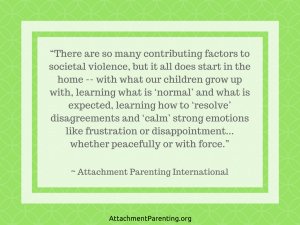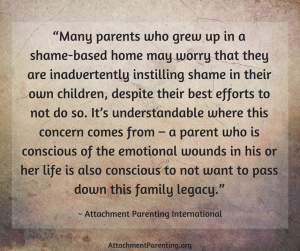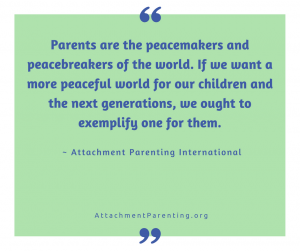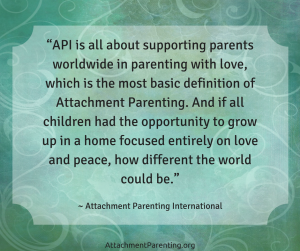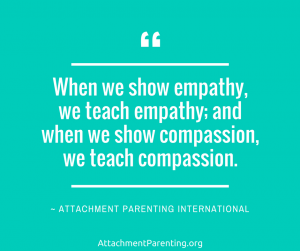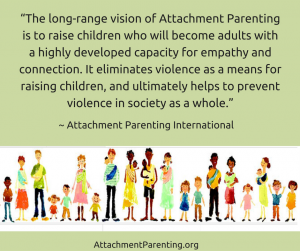Tag: teaching peace
What family legacy are you passing on to your children?
Peacemaker or peacebreaker?
Parenting with love, the most basic definition of Attachment Parenting
How we teach empathy and compassion
The long-range vision of Attachment Parenting
How different the world could be
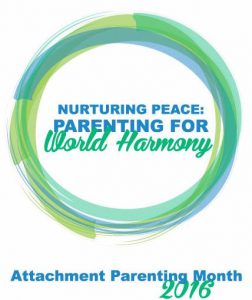 Editor’s Note: This post was originally published on 12/4/2015. As we continue to celebrate AP Month with this year’s theme, “Nurturing Peace: Parenting for World Harmony,” this article highlights the significance and magnitude of the choices we hold as parents — in the face of darkness, we can choose light and peace for our children and, with that, change the world.
Editor’s Note: This post was originally published on 12/4/2015. As we continue to celebrate AP Month with this year’s theme, “Nurturing Peace: Parenting for World Harmony,” this article highlights the significance and magnitude of the choices we hold as parents — in the face of darkness, we can choose light and peace for our children and, with that, change the world.
~~~~~~~~~~
“We’ve all got both light and dark inside of us. What matters is the part we choose to act on. That’s who we really are.”
~ J.K. Rowling in her book, Harry Potter and the Order of the Phoenix
San Bernardino, Paris, Chattanooga, Tunisia, Fort Hood, Lafayette, Kuwait, Colorado Springs — this short list is just a fraction of the mass shootings and terrorist activities that have occurred this year in the United States and around the world, not to mention the last few years. It is mind boggling, heart breaking and troubling to me as a parent whose goal is to raise compassionate, peaceful children. How am I suppose to do that exactly?
I try to shield my children from media splashed with coverage of these horrific events, but they hear about it anyway from conversations at school, church or the grocery store. Their school holds drills to practice in the case of a shooter. Our church prays for peace. We hear glimpses of the attacks on the radio in between songs. My daughters ask me why people are violent toward other people. My son asks me where the bad guys in the world live, so he can avoid living there when he grows up.
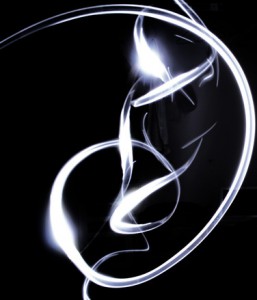 I want to retain their deep compassion for people, even those who seem impossible to understand or love, so I talk about how there there are no “bad guys.”
I want to retain their deep compassion for people, even those who seem impossible to understand or love, so I talk about how there there are no “bad guys.”
We all have the choice to make good or bad decisions, and the people who do these violent acts are making choices not based on love and compassion. These people may have grown up learning poor coping skills, or they may feel lost and confused and unloved themselves, or they may be involved with a group whose beliefs are very different than ours in how we live together and resolve conflict. It doesn’t make them “bad,” though they have definitely made poor choices.
But I struggle with that reasoning inside. It’s so easy, so natural, for humans to blame. It helps us make sense of the senseless, to find closure in hard situations. I want to blame something other than “poor coping skills.” But I also know that blaming a person or a society or religious beliefs wouldn’t satisfy me, either. I have found, through my own experience, that blame can be used to keep a person from seeing the big picture. When we blame, we are reclassifying a person or belief as “bad” — in our minds — and therefore someone or something that is outside of our need to feel compassion for. We can then more easily justify our anger.
To clarify, anger isn’t “bad.” Anger can be very useful in that we know what needs to be addressed in a relationship, what crosses that boundary in our personal comfort level. But it is very possible, with unchecked anger, to be destructive toward ourselves and others. It’s an important skill to learn ourselves and teach our children to manage anger so that our thoughts, words and actions are constructive and helpful in resolution. We turn the anger — and “need” to blame — that we feel toward perpetrators of these violent incidents into a desire to find real solutions, to comfort those who grieve, to rally with others in movements toward peace.
So, it’s not enough for me — as a parent — to explain to my children that some people just make poor life choices. I want to gather with others to find ways to prevent these acts of violence. And that looks different to different people, but for me, I think all the more of API. As cliche as it may sound, I truly feel that world peace is attainable, and I feel that parenting is a major key in preventing violence.
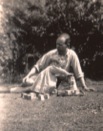 According to API Advisory Board member Sir Richard Bowlby, Bt, his father — the late John Bowlby, the father of Attachment Theory — had said that “attachment” is the scientific word for “love.”
According to API Advisory Board member Sir Richard Bowlby, Bt, his father — the late John Bowlby, the father of Attachment Theory — had said that “attachment” is the scientific word for “love.”
Peace and joy are inherent in real love, and what is more pure than that? API is all about supporting parents worldwide in parenting with love, which is the most basic definition of Attachment Parenting. And if all children had the opportunity to grow up in a home focused entirely on love and peace, how different the world could be.
In reference to the Harry Potter quote above, I choose the light.
**Small photo (above) of Richard, as a toddler, playing with his father, Dr. John Bowlby, the researcher who developed Attachment Theory
*Large stock photo source
A prayer for the motherless daughter
 Lesehu was her name. She was only 18 months old when her mama — like so many in Botswana, Africa — died from AIDS.
Lesehu was her name. She was only 18 months old when her mama — like so many in Botswana, Africa — died from AIDS.
I met her at the daycare center that my friend Marie Jose, a Catholic nun with 20 years of service in that country, had quickly put together to address the emergency of the alarming number of orphaned children as the pandemic took more lives each day.
As the numbers of orphans at the center grew, the children took care of the toddlers while the overwhelmed volunteers worked to give them all a good meal and make sure they were safe for the time they were there.
Sister Marie asked me what could be done for this little baby, Lesehu, who was so despondent that she barely moved at all. She did not eat, would not walk, and she had the expressionless face of a person in deep shock. Her mama was gone. Her world had completely changed in the most incomprehensible way. She was like a boat whose moorings had been severed, floating with nothing to anchor to, adrift in feelings that were too much for a tiny person of such a tender age.
I gently put her in my lap and hummed softly to her heart. After some time, she let me feed her while my concerned friend watched and nodded that this was good. Soon after, the traumatized child fell asleep in my arms. When it was time to go, I left some Bach Rescue Remedy with the caretakers for her. I placed a feather light kiss on her little forehead with all the force of my love.
No parent wants another family’s child to be left in a bad situation. So we make donations where our contribution will help. We might sign petitions or call our representatives to try to have impact on the conditions that cause such calamity. These actions have important value. But in this world of ours, there will always be those little ones who find themselves dependent on the care of strangers since their mama is no longer there.
 We know from emerging scientific study that the energy, the potent essence, of thought and heartfelt concern does indeed travel across time and space to reach the ones for whom we are directing our attention. The field of nursing has a substantial body of research about the positive impact of prayer on the recovery of patients after surgery. Plants grow measurably better when someone has sent them positive energy. The Institute of HeartMath conducts pioneering work on the reach of the quantifiable energy of the human heart as it communicates to others across great distances.
We know from emerging scientific study that the energy, the potent essence, of thought and heartfelt concern does indeed travel across time and space to reach the ones for whom we are directing our attention. The field of nursing has a substantial body of research about the positive impact of prayer on the recovery of patients after surgery. Plants grow measurably better when someone has sent them positive energy. The Institute of HeartMath conducts pioneering work on the reach of the quantifiable energy of the human heart as it communicates to others across great distances.
Yet, independent of what science has to say about it, whispering a deeply felt wish on behalf of another person is just something we instinctively do. It’s built into us to focus our caring into a prayer for another’s well-being, to keep them safe, increase their happiness, or to bless them.
From my side of the world, I have thought of Lesehu often and wished that there was a way I could ease her sorrow. So it was a great relief when I realized that I could — this is my prayer for her:
May the love of the Divine Mother soothe your sorrow and dry your tears. I offer my piece of that energy to you now with all my heart.
May you be certain that the Mommy who gave you life wanted you to live and to thrive. She watches over you still.
There is nothing you could have done that would have changed how things happened, so let that doubt rest.
May you always know that you are worthy of love and deserving of happiness.
May you have thoughts that bring you peace and ease the longing for that which you do not have because of circumstances beyond your control.
May you reach for healthy relationships that fill you up with the sweetness of sincere caring.
May you make the best choice for your highest good in every instance so that your confidence in yourself grows as you grow.
May you believe in yourself, because I believe in you.
May there always be someone kind nearby to encourage you, to celebrate your successes, and to comfort you when you need it.
May a kind woman’s hands braid your hair with tenderness and let you know that becoming a woman is a wonderful miracle.
May you draw to you people and experiences that nurture you, that delight you, and that show you that you are creating the life of love and happiness that is your birthright.
When you become a woman, may you have the confidence to pass gracefully into all that will come to you in this lifetime.
May you find true love with the soul who will adore you and cherish your true essence.
May you know that in your belly is the spring of life that connects you to the woman who brought you into the world.
May you laugh and giggle freely — I will hear you and smile, little daughter.
May this love I send out reach all children everywhere who can benefit from it.
What if we do have the ability to shift the suffering of another person by sending our love and concern to them via the “quantum telegraph service”?
I am going to respond with that human instinct, because it feels true to believe that though I cannot touch this precious child’s face, perhaps my voice can be a whisper of love that touches her heart.

